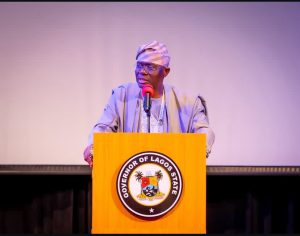SANWO-OLU REAFFIRMS NEED FOR COORDINATED FAITH LEADERSHIP

Lagos State Governor, Mr. Babajide Olusola Sanwo-Olu has emphasized the urgent need for deeper collaboration between government and religious leaders, noting that Alfas, Imams, and Pastors remain crucial voices in shaping public understanding and countering misinformation across communities.
Speaking at the Capacity Training and Enhancement Workshop for Imams and Ulama in Lagos State, organised by the Council of Chief Imams and Ulama and held at the Lagos Central Mosque, the Governor represented by his Deputy, Dr. Kadri Obafemi Hamzat highlighted the influence of messages delivered from the pulpit during Friday prayers and Sunday services.
He stressed that when faith leaders communicate government intentions clearly, citizens are more likely to trust and align with ongoing developmental efforts.
According to him, “If we fail to actively engage these key faith leaders, we disadvantage ourselves. Their voices reach the people directly, and partnering with them ensures our messages are both heard and trusted.”
Sanwo-Olu also expressed concern over declining religious identity among young people and urged faith leaders to work collectively to reinforce values that preserve religious heritage.
He questioned: “What are we doing that our children are leaving our religion? And how can we ensure they remain rooted in our faith traditions?”
The Governor further stressed the importance of strengthening the Nigerian Inter-Religious Council (NIREC), describing it as a vital platform for sustaining peace and preventing communal disputes.
Delivering a lecture titled “Promoting Self-Reliance and Economic Empowerment of Spiritual Leaders,” the Special Adviser to the Governor on Islamic Matters, Alh. Jebe Abdullahi Ahmad, called for renewed efforts to boost the economic independence of Imams and spiritual leaders. He noted that financially empowered clerics play a key role in community development and stability.
He highlighted pathways to self-reliance including skill acquisition, entrepreneurship, time management, and access to empowerment initiatives such as LSETF and community development grants. According to him, government, private sector players, and religious institutions must collaborate to create sustainable economic structures for spiritual leaders.
In another lecture titled, “The Imam as the Bridge of Trust between Government and the People,” the National Missioner of the Ansar-ud-deen Society of Nigeria, Sheikh Abdur’Rahman Olanrewaju Ahmad, underscored the pivotal role of religious institutions in nation-building. He noted that clerics often serve as interpreters of government policies to the public, making them essential partners in development.
Earlier, the Grand Chief Imam of Lagos and Chairman of the Council of Chief Imams and Ulama, Sheikh Sulaiman Oluwatoyin Abou-Nolla, affirmed that collaboration between faith-based institutions and government is vital for peace, progress, and national prosperity.
He added that the seminar provides a platform to explore practical strategies rooted in Islamic teachings and shared values to strengthen this partnership for Nigeria’s development.

